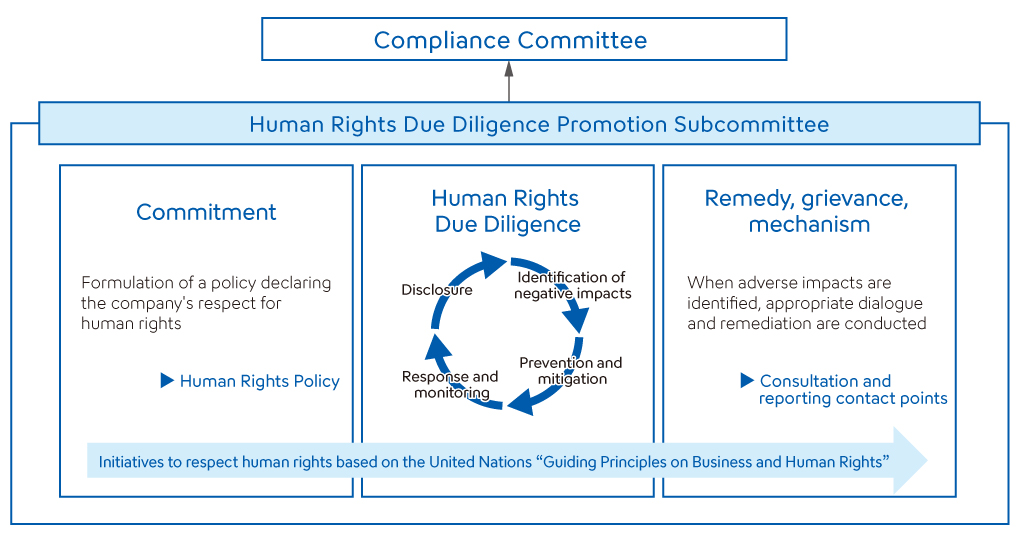Governance
Respect for Human Rights
Policies and Initiatives Related to Human Rights
Sysmex pursues delivering "confidence" to all its stakeholders through business activities under the Sysmex Way, the Group corporate philosophy, and our Shared Values. We believe that respect for human rights is fundamental to achieving "confidence," and we emphasize respect for human rights and the elimination of discrimination in our Global Compliance Code. We have also established a Human Rights Policy to serve as a concrete guideline for respecting human rights. Based on this policy, we strive to build a corporate management framework and workplace environment that respect the human rights of all employees and various stakeholders. This code and policy are in keeping with the UN’s Guiding Principles on Business and Human Rights, as well as the spirit of the ILO’s Core Labor Standards, which define the minimum labor standards that must be preserved in the workplace.
To ensure that these principles are effectively put into practice, Sysmex has clarified its zero-tolerance policy regarding discrimination, harassment, forced labor, and child labor, and conducts various types of training to ensure employee awareness of these matters. We joined the UN Global Compact in 2011 and clarified our corporate stance in relation to the Compact’s Ten Principles regarding human rights, labor, the environment, and anti-corruption.
Human Rights Due Diligence
Sysmex stipulates the implementation of human rights due diligence (human rights DD) in its Human Rights Policy and Global Compliance Code. Under the Compliance Committee, which oversees Group compliance, we have established a Human Rights Due Diligence Promotion Subcommittee. This subcommittee works to identify and address the impacts of our business activities on human rights not only within the Company but also across the supply chain, and to prevent or mitigate any negative impacts.
In fiscal 2024, in cooperation with external experts, we conducted a prioritization based on the degree of business impact and country-specific human rights risks. We surveyed suppliers involved in the procurement and production processes of our core hematology business. Questionnaires were sent to approximately 400 key business partners in Japan and overseas to assess the status of their human rights management and to confirm whether any human rights violations were present, resulting in a response rate of 70%. Based on the survey results, we carried out risk mapping using severity and likelihood as indicators, and identified human rights risks that should be prioritized. While no serious risks were identified in this round of assessments, “occupational safety and health” and “harassment” were recognized as the highest-priority human rights risks. For certain business partners, we are conducting additional interviews to confirm details and engaging in dialogue to encourage improvements in their human rights initiatives.
Sysmex will continue to establish mechanisms to proactively identify and address potential human rights impacts, ensuring that its business activities and transactions with business partners do not contribute to or become involved in human rights violations.
| General Human Rights Management |
|
| Management by human rights issue |
|
| Status of human rights violations |
|

Grievance Mechanism Related to Human Rights
Sysmex receives consultation and reporting from suppliers, partners, customers, and members of the local community in order to recognize any adverse human rights impact caused by our business activities and to enable us to take immediate corrective action when necessary. We have a system in place to appropriately handle information received, protect anyone who consults with us or reports to us from being disadvantaged, and to take necessary corrective and remedial measures if an adverse human rights impact is identified.
Education and Training on Respect for Human Rights
Sysmex strives to prevent human rights abuses by conducting training with the purpose of preventing harassment and ensuring that employees have a correct knowledge of labor matters.
Fiscal 2024 Results
- Harassment and labor management training for newly appointed supervisors, new hires, existing leaders, and on a division basis.
- Unconscious bias1 training (for all employees2)
- Training regarding sexual diversity (for all employees2)
- Management training to improve psychological safety (for supervisors, on a division basis)
- Psychological safety seminar conducted by an industrial physician (for all employees2)
- Global compliance training including the respect for human rights (for all employees)
- 1 Seeing things in a biased way due to unconscious prejudices or preconceptions
- 2 Scope: in Japan
Labor-Management Dialogue
Sysmex respects employee rights, such as the right to form a union and the right to collective bargaining, based on its participation in the UN Global Compact and support for the ILO’s Core Labor Standards.
As of March 2025, 64% of Sysmex Corporation employees were members of the Sysmex Union, our in-house labor union. We conduct annual collective bargaining with the Sysmex Union. In fiscal 2024, in addition to regular meetings, labor and management met to discuss productivity improvement through optimization of working hours and streamlining operations; working environments having diverse employees and the personnel system; responses to working environment changes, and the promotion of a “healthy company”. Such meetings are also held at Group companies. Labor unions have been formed at overseas Group companies including Jinan Sysmex, Sysmex Vietnam, and HYPHEN BioMed, and hold regular dialogues with respective Group companies. In addition, Sysmex CNA has formed an employee group consisting of departmental representatives for quarterly labor-management discussions on topics such as work environments, management of work hours, and the amount of paid leave days taken. Sysmex TMC also holds quarterly labor-management meetings.
